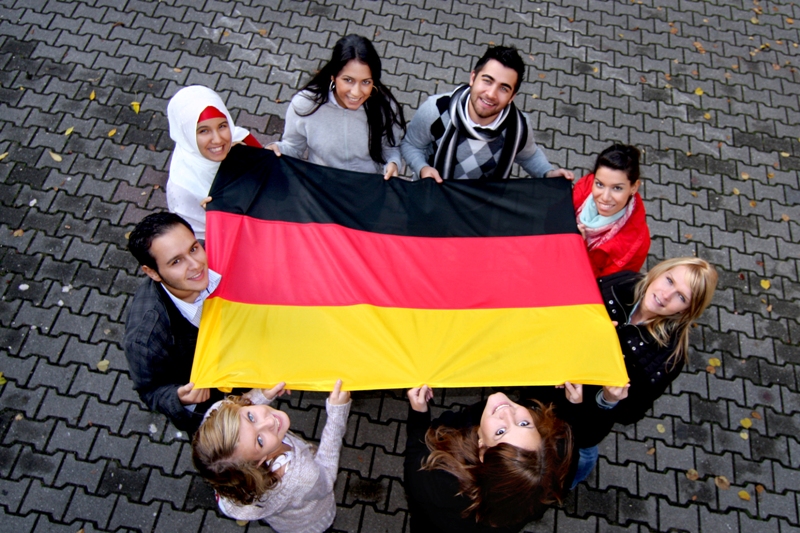The German Bertelsmann Foundation has published a new report examining the lives of Muslims in Europe. Taking a comparative approach, the study’s authors rely on data from five countries – Germany, Austria, Switzerland, France, and the UK. More than 3,000 Muslims participated as respondents in the surveys for the report.
Enhanced labour market participation
According to the study, successful integration is visible particularly from second generation onwards. Particularly in the field of labour market participation, the sample drawn from Germany’s Muslim population did not diverge significantly from the country’s average: 60% of respondents held a full-time job; 20% were employed part-time. Unemployment figures of the two groups were similarly comparable. (Pay remained unequal, however.)
According to the study’s authors, the advances in Muslim labour market participation are linked to the high demand for labour in Germany, as well as to the eased labour market access for newly arrived migrants.
Growing societal integration
Growing rates of labour market integration appear to be based on enhanced linguistic skills: 73% of children born to immigrant Muslim parents assert that German is the language they speak best. The share of native German speakers is further increasing with every successive generation.
Successful integration, however, goes beyond the purely utilitarian sphere of the labour market. 84% of Muslim respondents regularly spend their free time with non-Muslims, and two thirds assert that their circle of friends is made up of pre-dominantly non-Muslim acquaintances. While only every second Muslim holds a German passport, 96% of respondents asserted that they felt a close bond with Germany.
An inegalitarian educational system
Yet even the Bertelsmann study concedes that significant challenges remain. The most notable one is linked to Germany’s educational system. The country’s schools have been repeatedly criticised by national and international experts for entrenching and reinforcing existing social divides through an early and rigid separation of children into different academic tracks.
Consequently, the all-important factor determining pupils’ educational achievement remains their parents’ social and economic capital. Unsurprisingly, the sons and daughters of the large group of Muslim blue collar immigrants tend to fare poorly in such a context: in Germany, 36 per cent of young Muslims leave school before the age of 17 – compared to only 11 per cent in France.
Hurdles for ‘pious’ Muslims
Nor is ‘integration’ equally easy for everyone: the group of (visibly) pious Muslims struggles to participate in the labour market and to find employment that matches their qualifications.
The researchers attribute this at least in part to discriminatory practices in the workplace: in Great Britain, where rules and regulations concerning e.g. the wearing of the hijab while at work are more permissive, the more pious segments of the Muslim population are active in the same jobs as their less observant co-religionists.
According to Yasemin El-Menouar, one of the Foundation’s experts, there are considerable improvements to be made when it comes to the full legal recognition of Muslim religious communities, as well as to the fight against discrimination in Germany: “Religious symbols should not lead to disadvantages in job applications, and religious needs such as obligatory prayers and mosque visits should be reconcilable with full-time employment” – or so El-Menouar argues.
Reactions by policymakers
El-Menouar’s demand was taken up by Volker Beck, the Green Party spokesman for migration and religious affairs: he stressed that – in line with existing legislation – the discrimination of hijab-wearing Muslim women in the workplace needed to be addressed and prevented.1 Beck’s comments are interesting particularly against the backdrop of renewed wrangling in German courts surrounding the hijab.
Beck’s counterpart from the Social Democrats, Kerstin Griese, focused on the inequalities in Germany’s educational system and challenged all political forces to address them in a systematic manner.2
Questions concerning the reliability of the findings
Generally, the study’s positive findings were received as something of a pleasant surprise by many commentators.3 Yet there have also been critical voices.
Some have questioned the reliability of the study’s findings. The pro-business think-tank Institut der deutschen Wirtschaft, for instance, has drawn attention to other data sets that paint a different picture. Here, Muslims do appear to be significantly less likely to hold a job than other members of society.4
Moreover, the Bertelsmann Foundation’s research only incorporates the voices and the data of Muslims who have arrived in Germany prior to 2010, meaning that its findings do not cover the recently arrived Syrians, Iraqis, and Afghans. Of course most of these men and women are still relatively far removed from firm and lasting labour market participation and social inclusion.
Politicised critiques
Other criticisms were less technical and more ideological in nature. Conservative daily Die Welt complained that the study had failed to tease out supposed “mental or cultural hurdles to integration”. More particularly, the paper demanded that Muslim respondents be systematically questioned about their affinities to religious fundamentalism.5
The chairman of the Islamist-leaning Islamic Community Millî Görüş (IGMG), Bekir Altaş, came at the results from a different, albeit equally intransigent angle. Altaş read the study’s findings less as a sign of successful societal participation than as a damning indictment of the German state’s treatment of its Muslim citizens.
German Muslims, according to Altaş, were victimised by a “restrictive policy on Islam” and by the “inadmissible and generalistic demands” placed upon them by politicians. Especially in the area of foreign policy, he argued, German Muslims had become a mere “plaything” of policymakers’ attempts to “settle accounts” – a thinly veiled reference to recent German-Turkish diplomatic spats.6
Sources
http://www.islamiq.de/2017/08/26/bertelsmann-studie-stoesst-auf-gespaltenes-echo/ ↩
http://www.islamiq.de/2017/08/26/bertelsmann-studie-stoesst-auf-gespaltenes-echo/ ↩
https://www.tagesschau.de/multimedia/video/video-321263.html ↩
https://www.iwkoeln.de/presse/iw-nachrichten/beitrag/holger-schaefer-arbeitsmarktintegration-von-muslimen-vermeintlicher-erfolg-358606 ↩
http://hd.welt.de/politik-edition/article167983092/Einseitiger-Blick-auf-Integration.html ↩
http://www.islamiq.de/2017/08/26/bertelsmann-studie-stoesst-auf-gespaltenes-echo/ ↩






